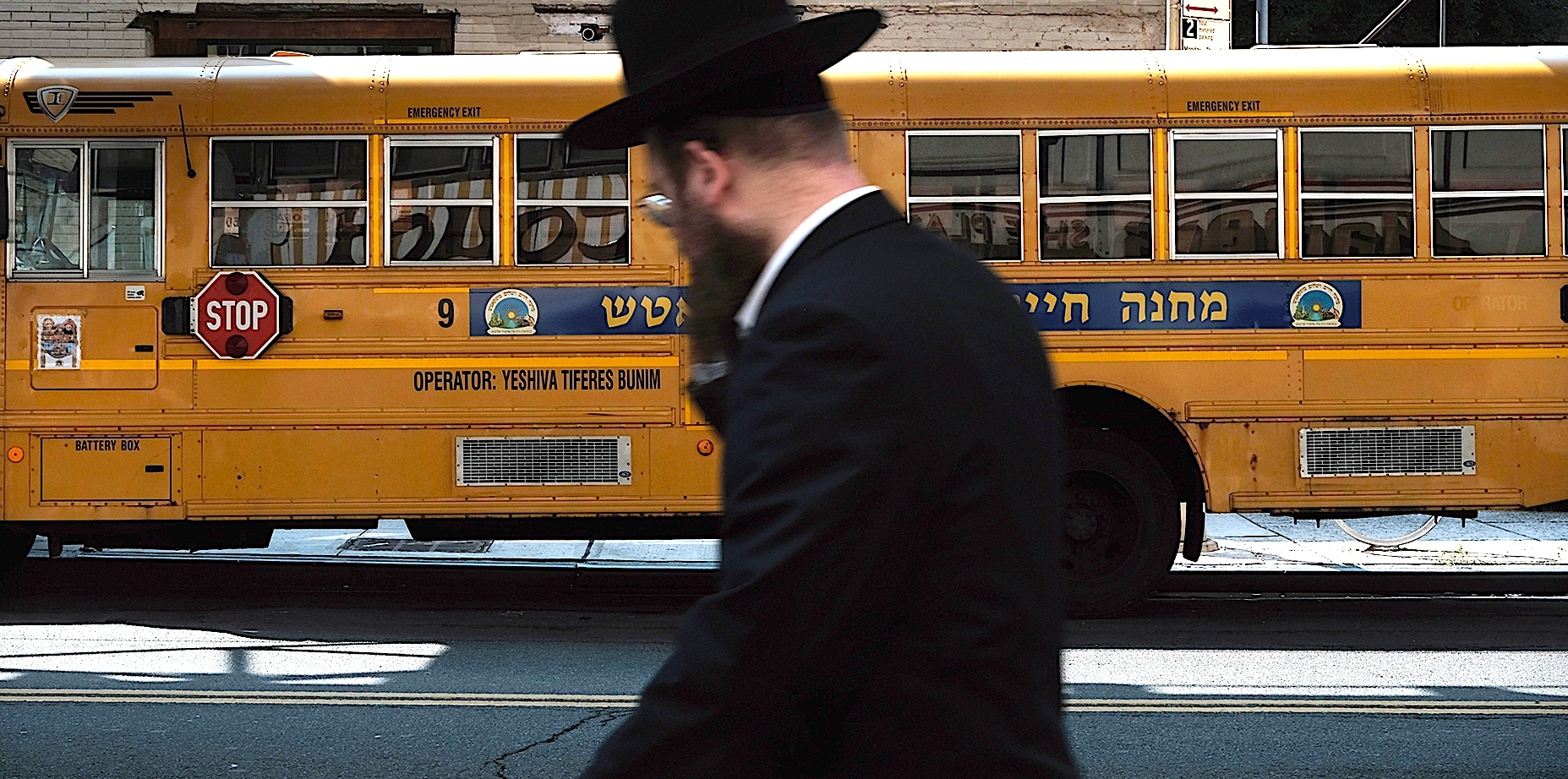18 NYC yeshivas do not adequately teach secular studies, investigation finds
The letters represent the most significant determination by a government agency that the schools are failing to teach secular studies to their students

A yeshiva school bus drives through Brooklyn’s Borough Park on Sept. 12, 2022.(Spencer Platt/Getty Images)
(JTA) — The New York City Department of Education has found that 18 yeshivas are falling short of secular education standards, a landmark ruling in the ongoing fight over government oversight of Hasidic day schools.
Letters sent to the yeshivas by the education department on Friday mark the culmination of an eight-year investigation that has pitted the city against the leadership of its large Hasidic communities. Arriving after years of activism by secular education advocates — and pushback from the yeshivas’ defenders — the letters represent the most significant determination by a government agency that the schools are failing to teach secular studies to their students.
In addition, according to The New York Times, seven yeshivas that were investigated were found to be complying with the law. The New York State Education Department must now affirm the findings of the investigations.
The education department sent the letters on Friday, close to the beginning of Shabbat, and did not make them public. Two were published online by The City, a nonprofit news organization covering New York.
Those letters show that investigators saw no instruction in English during their visits in 2019. Ultimately, city officials concluded about Yeshiva Bnei Shimon Yisroel of Sopron, for example, that the, school “has not demonstrated that it is providing instruction that is substantially equivalent to the public schools in the New York City school district,” according to the letter sent to the Williamsburg, Brooklyn, boys school. The letter said that the school is not meeting educational standards “in the four core academic subjects of [English Language Arts], mathematics, science, and social studies/history.”
But what consequences the schools may face remains unclear. The two published letters mandate that the yeshivas in question create a plan within the next 60 days to reach a “substantially equivalent” level of secular education by the end of the next school year. But the two letters did not mention any further consequences if those deadlines are not met. Earlier this year, a state court ruled that the state Education Department lacks the authority to close the schools if they fail to provide a secular education, though it could deprive them of public funding.
“The findings profoundly change the playing field though the game has a long way to go,” David Bloomfield, a professor of education law at Brooklyn College and the CUNY Graduate Center, told the Jewish Telegraphic Agency. “This is the first time there have been official findings of over a dozen yeshivas violating the law on secular instruction.”
He added, “So now the cure is clearly in government hands. How long and how complete that process will be is open to question.”
The letters show that city investigators confirmed what journalists have twice documented and advocates have long argued: that many yeshivas barely teach secular subjects, required under state law. Currently, the schools spend nearly all of their day teaching a traditional Jewish studies curriculum in Yiddish, with a heavy focus on Talmud. Secular studies, according to the letters, occupies only a small portion of the curriculum, with few resources devoted to the teaching of subjects like English and math.
One investigation found that secular studies at a yeshiva was taught by an educator whose prior experience includes one year of serving as a substitute teacher in the city education department as well as working in a public library.
The schools and their defenders maintain that students obtain necessary skills across a wide range of topics, from math to the arts, within their Jewish studies curriculum.
The state determinations follow years of public advocacy and court filings by activists, many with roots in haredi Orthodox communities, to force yeshivas to teach secular studies. They also come after an investigative series in The New York Times examining subpar secular education standards in New York City-area yeshivas, which revealed a similar story to that told by the New York Jewish Week in 2015. And they come during the administration of Mayor Eric Adams, who has received support from Hasidic leaders and, earlier this year, said public schools should “learn what you are doing in the yeshivas to improve education.”
The most prominent of the activist groups, Young Advocates for Fair Education, or YAFFED, said in a statement, “We hope that the completion of this investigation compels the city and Mayor Eric Adams to act on behalf of thousands of students who are being deprived of their right to a sound basic education.”
Haredi groups, meanwhile, have contended that government oversight of secular standards at yeshivas constitutes overreach into a successful system, as well as a violation of their communities’ prerogative to educate their children as they wish. In response to the education department’s letters, Parents for Educational and Religious Liberty in Schools, or PEARLS, a defender of the yeshivas, said in a statement that the investigation was based on “a skewed set of technical requirements.”
“Parents choose yeshiva education for their children because of the religious, moral and educational philosophy and approach of those who lead yeshivas,” the statement said, according to multiple reports. “They will continue to do so, regardless of how many government lawyers try to insist that yeshiva education is best measured by checklists they devise rather than the lives yeshiva graduates lead.”
According to the letters, one of the schools appears to have changed its name in the midst of the investigation — with the education department being told the school had closed. Another school refused requests for followup visits from investigators and did not provide requested materials demonstrating its secular curriculum.
This article originally appeared on JTA.org.














